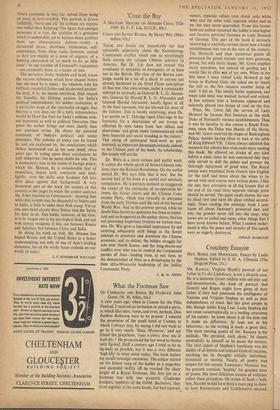What the Footman Saw
A FEW years ago, when in Cannes for the Film Festival, I received an invitation to attend a party, at which film stars, rastas, and even, perhaps, Don Porfirio Rubirosa were to be present. I amazed the proprietor of the small hotel at Cannes, at which I always stay, by saying I did not want to go to it very much. 'Mais, Monsieur,' said my friend the proprietor, 'vous n'aitnez done pas le high-life ?' He pronounced the last word to rhyme with fig-leaf. Half a century ago I tried to be as fig-leafy as possible, but it was a very different `high-life' to what exists today. The book before me recalls nostalgic memories. The author started on the lowest rung of the .ladder as a page-boy and ascended swiftly till he reached the dizzy height of a Royal Footman. His first job as a footman was with two eccentric Gladstone brothers, nephews of the GOM. Bachelors, they lived together at the same house, but had separate
menus, separate cellars (one drank only white wine and the other red), separate tables and so on, but they never quarrelled. From this house- hold our author mounted the ladder a step higher and became personal footman to Lady Howard of Glossop. This part of the book is intensely interesting to anybody curious about how a feudal establishment was run at the turn of the century. The Howards and their numerous guests all possessed the grand manner and were generous, proud, but only fairly happy. Mr. Gorst supplies many anecdotes, but instead of quoting any I would like to offer one of my own. When in my late teens I once visited Lady Howard at her house in Rutland Gate, she asked me to 'touch the bell as the fire requires another lump of coal.' I did so. The stately butler appeared, and when told what was wanted, bowed and retired. A few minutes later a footman appeared and solemnly placed two lumps of coal on the fire,
When Mr. Gorst left the service of Lady Howard he became first footman at the sixth Duke of Portland's various establishments. Thus it was he becaine in due course a Royal Foot- man, since the Duke was Master of the Horse, and Mr. Gorst received his wages at Buckingham Palace, besides having often to wait at the table of King Edward VII. I have always admired this monarch but admire him even more since reading this book. He allowed no drinks of any kind before a meal, since he was convinced that they only served to dull the palate and prevent the thorough enjoyment of good wine. The Royal menus were translated from French into English for the staff and notes about the wines to be served with each course were written down. I like the idea then prevalent in all big houses that at the end of the meal three separate vintage ports should be served. The guest could choose the one he liked best and have his glass refilled accord- ingly. Since reading this nostalgic book I now know all about footmen's powdered hair and why the powder never fell into the soup, why mews are so called and many other things that I have never known before. What I cannot under- stand is why the peace and serenity of this epoch were so eagerly destroyed.
GERALD HAMILTON


































 Previous page
Previous page